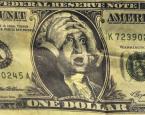Tag Archives : easy money
Easy Money Is Creating the Conditions for a Bigger European Economic Crisis
At the beginning of the year, I was asked whether Europe’s fiscal crisis was over. Showing deep thought and characteristic maturity, my response was “HAHAHAHAHAHAHAHAHA, are you ;@($&^#’% kidding me?” But I then shared specific reasons for pessimism, including the fact that many European nations had the wrong response to the fiscal crisis. With a […]
read more...After Reviewing the Federal Reserve’s Lousy Track Record, Thomas Sowell Asks Why such a Deeply Flawed Institution Should Be Allowed to Accumulate more Power
When speaking about the difference between the private sector and the government, I sometimes emphasize that mistakes and errors are inevitable, and that the propensity to screw up may be just as prevalent in the private sector as it is in the public sector. I actually think the government is more likely to screw up, for […]
read more...Can We Envision a World without a Central Bank?
I’ve expressed concern about QE3 and other decisions by the Federal Reserve about monetary policy, but I have also admitted that it’s difficult to know the right monetary policy because it requires having a good idea about both the demand for money and the supply of money. But this raises a bigger issue. The only […]
read more...QE3: A Risky Ploy to Solve the Problems of Bad Fiscal Policy with Bad Monetary Policy
For all intents and purposes, Bernanke has said that the Fed is going to relentlessly focus on the variable it can’t control (employment) at the risk of causing bad news for the variable it can control (inflation). Since that hasn’t worked in the past, it presumably won’t work in the future.
read more...If We Can’t End the Fed, Can We at Least Subject It to Competition?
Ron Paul has made “End the Fed” a popular slogan, but some people worry that this is a radical untested idea. In part, this is because it is human nature to fear the unknown. But there are plenty of examples of policy reforms that used to be considered radical but are now commonplace. Statists used […]
read more...Ten Reasons to Dislike the Federal Reserve
Nothing compares to the depth and substance of Professor George Selgin’s scholarly take-down of the Federal Reserve, but this video by a local libertarian has a very authentic feel. Julie lists 10 reasons to dislike the Fed. 1. The Fed has too much power. 2. The Fed has devalued the currency. 3. The Fed hurts […]
read more...European Central Bank Research Shows that Government Spending Undermines Economic Performance
Europe is in the midst of a fiscal crisis caused by too much government spending, yet many of the continent’s politicians want the European Central Bank to purchase the dodgy debt of reckless welfare states such as Spain, Italy, Greece, and Portugal in order to prop up these big government policies. So it’s especially noteworthy […]
read more...What’s the Solution to Europe’s Fiscal Crisis: Spending Cuts, or Bailouts and Easy Money?
In hopes of stopping investor panic about Europe’s fiscal crisis, the world’s major central banks just announced that they will do whatever is needed to ensure financial markets don’t freeze up. This could be an appropriate and relatively benign use of the lender-of-last-resort powers, or it could signal another round of reckless easy money and […]
read more...The Federal Reserve, the “Twist,” Inflation, QE3, and Pushing on a String
In a move that some are calling QE3, the Federal Reserve announced yesterday that it will engage in a policy called “the twist” – selling short-term bonds and buying long-term bonds in hopes of artificially reducing long-term interest rates. If successful, this policy (we are told) will incentivize more borrowing and stimulate growth. I’ve freely […]
read more...Another Fed-Bashing Video
I generally try to avoid commenting on monetary policy. Not because I don’t have opinions, but for the simple reason that I don’t follow the issue closely enough to feel fully confident about what I say. This doesn’t mean I’m happy with Fed Chairman Bernanke. But I’m most likely to be upset that he is […]
read more...

